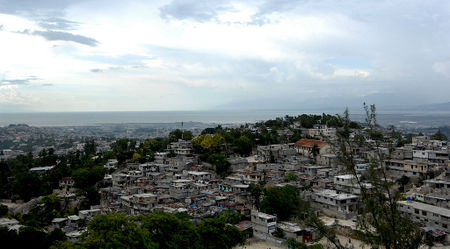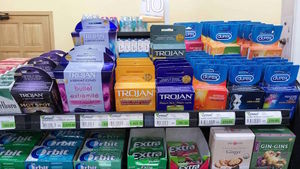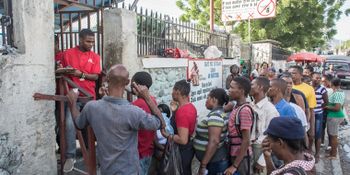Gynopedia needs your support! Please consider contributing content, translating a page, or making a donation today. With your support, we can sustain and expand the website. Gynopedia has no corporate sponsors or advertisers. Your support is crucial and deeply appreciated.
Port-au-Prince: Difference between revisions
Hella Dudes (talk | contribs) (→Costs) |
Hella Dudes (talk | contribs) |
||
| Line 174: | Line 174: | ||
[http://www.expat.com/en/business/central-america/haiti/6_health/pharmacies/ Expat Pharmacy List]<br> | [http://www.expat.com/en/business/central-america/haiti/6_health/pharmacies/ Expat Pharmacy List]<br> | ||
[http://www.msf.ca/en/country-region/haiti MSF]<br> | [http://www.msf.ca/en/country-region/haiti MSF]<br> | ||
[http://www.scms.pfscm.org/scms SCMS (Global Access to HIV/AIDS Medication] | [http://www.scms.pfscm.org/scms SCMS (Global Access to HIV/AIDS Medication]<br> | ||
[http://iwhp.sogc.org/index.php?page=171 International Women's Health Program (Haiti)] | |||
==References== | ==References== | ||
Revision as of 12:55, 1 March 2017
OVERVIEW
Port-au-Prince is the largest city in Haiti and the second largest in the Caribbean. The country struggles with having the reputation as the poorest country in Western hemisphere and its turmoils have been compounded by disastrous earthquakes and hurricanes in recent years. This has left the country in need of international aid and a devastating lack of resources. This has obviously had a dramatic effect on sexual, reproductive and women's health care needs throughout the country. Though Port-au-Prince has more civil resources available than many of the countries more rural areas, there is still undoubtedly a lot of improvement to be made in these areas. Some of the issues include the lack of availability of contraception, overpriced feminine hygiene products, lack of proper medical facilities, unaffordable and outdated hospitals, a high rate of HIV infection and an alarming rate of sexual abuse against women[1]. Additionally, abortion is completely illegal and there is little help from government organizations to curb the STI infection rate and lack of education on family planning.
Contraception (Birth Control)
General Note: There are many types of contraceptives, also known as "birth control," including IUDs, oral contraceptives, patches, shots, and condoms, etc. If you would like to view a full list, click here.
Laws & Social Stigmas
Despite the fact that Haiti has a long history with oral contraceptives[2], the country has a staggeringly low rate of 37.8% of women between the ages of 15 and 49 report using any kind of contraception at all. This is the lowest rate of any Caribbean country. An overwhelming majority of women that do use birth control opt for the contraceptive injection. [3] There have been multiple campaigns with mixed results to raise awareness for the use of contraceptives. Many women are raised in a conservative Christian families and don't want to admit that they are having premarital sex, so discussions about birth control are not likely to be widely discussed by most Haitians, especially amongst the youth. [4]
What to Get & Where to Get It
According to the International Planned Parenthood Federation, there are over 20 types of hormonal contraceptives available. Most that are available are phasic and combined oral pills, but there is also a wide variety of hormonal implants available. There is only one hormonal IUD available by the name of "Mirena." The contraceptive ring (Nuva Ring) does not seem to available for purchase in Haiti.[5]Condoms can be purchased at larger retailers but more difficult to find at smaller businesses. For a comprehensive list of all available hormonal contraceptive available in the country, visit the Haiti IPPF page.
Costs
KORE, loosely translated, means "I've got your back" in Haitian Creole, is a brand of condom that became available in Haiti in 2013. The company aimed to provide a widely available and much more affordable condom for the people of Haiti. [6] A pack of 3 brand name condoms usually costs somewhere between 200-300 gourde.
Emergency Contraception (Morning After Pill)
Important Notes: Emergency contraception may prevent pregnancy for three days (72 hours) and sometimes five days (120 hours) after unprotected sex. Take EC as soon as possible after unprotected sex. If you don't have access to dedicated EC, oral contraceptives can be used as replacement EC, but remember the following: 1) Only some contraceptives work as EC 2) Different contraceptives require different dosages and time schedules to work as EC 3) You must only use the first 21 pills in 28-day packs and 4) They may be less effective than dedicated EC. For general information on emergency contraceptives, click here and here.
Laws & Social Stigmas
The morning after pill is rarely available over the counter in Port-au-Prince. If it can be found, it is likely imported and will contain instructions in a foreign language which may render the product useless.[7] If you are in need of emergency contraception in Haiti, you have the option of taking larger doses of regular hormonal birth control instead of the morning after pill.[8]
What to Get & Where to Get It
Note: The longest-lasting EC is currently ellaOne. It lasts up to 5 days (120 hours) after unprotected sex. Check to see if your country carries ellaOne. If your country doesn't carry ellaOne, copper IUDs may also prevent pregnancy up to 5 days after unprotected sex. If none of these options are available, and it's been over 3 days since you had unprotected sex, you can still take EC, which may work up to 5 days. Note that EC pills are not 100% effective and should be taken as soon as possible.
The following is a list of available oral Contraceptives used for emergency contraception (Progestin Only)[9]
Take 40 pills within 120 hours after unprotected sex: Ovrette Take 50 pills within 120 hours after unprotected sex: Microval
Oral Contraceptives used for EC / Progestin-Estrogen Combined Note: in 28-day packs, only the first 21 pills can be used
Take 2 pills within 120 hours after unprotected sex and take 2 more pills 12 hours later: Eugynon Neogynon Nordiol Ovral Take 4 pills within 120 hours after unprotected sex and take 4 more pills 12 hours later: Lo-Femenal Minigynon 30 Nordette
Costs
Sexually Transmitted Infections (STIs/STDs)
Important Notes - Learn about PEP and PrEP: If you think that you've been recently exposed to HIV (i.e. within 72 hours), seek out PEP (Post-Exposure Prophylaxis). It's a month-long treatment to prevent HIV infection after exposure, and it may be available in your city. Take PEP as soon as possible. For more information, click here. If you are at risk of HIV exposure, seek out PrEP (Pre-Exposure Prophylaxis). It's a daily oral pill that can prevent HIV infection before exposure. To learn more about PrEP, click here.
Laws & Social Stigmas
Haiti has a 1.8 percent prevalence rate of HIV/AIDS, among the highest percentage-wise in the Caribbean region (behind the Bahamas, and Belize). However, it has the most overall cases of HIV/AIDS in the Caribbean region with an estimated 120,000 HIV/AIDS-positive Haitians.[10] One of the best ways to avoid contracting HIV and other STIs is to regularly using condoms. Contact the International Planned Parenthood Federation to inquire about making an appointment for an STI test if you are sexually active. Getting tested regularly is recommended to avoid unknowingly spreading disease further as well as diagnose anything you may have contracted so it can be cured or treated before irreversible damage is potentially done to your body.
What to Get & Where to Get It
Testing Facilities
- IPPF Association Pour la Promotion de la Famille Haitienne
8 Rue La Forest, Delmas 31
HT 6120
Port-au-Prince, Haiti
P: (509) 2811-0411
E: info@profamilhaiti.org
- AHF Haiti - Avenue Lamartiniere 1, Impasse Rigaud, Bois Verna Port-au-Prince Haiti [11]
Support
If someone you know is incarcerated in Port-au-Prince or elsewhere in Haiti and has contracted or is at risk of contracting HIV, the Aids Healthcare Foundation can help. They provide testing and medicine for those in need. Visit their website for more information.
Costs
Many clinics run by NGOs offer free STI/STD screening.
Medications & Vaccines
Laws & Social Stigmas
What to Get & Where to Get It
"Fluconazole" is the name of the active ingredient in yeast infection medication. Make sure this is listed under active ingredients to ensure that you are buying an effective medication. PReP is not available to buy in Haiti.[12] As far as HPV vaccinations go, Haiti has a "Pilot Program", which means it is available but not readily accessible to everyone. Click here to be redirected to a list of 11 pharmacies in Port-au-Prince and their Facebook pages.
Hôpital Immaculée Conception has a steady supply of antiretroviral HIV medication.[13]
Costs
In 2004, initial antiretroviral therapy (ART) in Haiti cost approximately $US 1,000 per patient per year.[14]
Menstruation
Note: In addition to pads and tampons, you can also use menstrual cups and menstrual underwear for your period. To learn more about menstrual cups, click here. To learn more about menstrual underwear, click here.
Laws & Social Stigmas
The women of Haiti have little access to education on feminine hygiene and menstruation. In one poll, nearly 25% of women surveyed did not know why they had their period. Given the income of the women ranged from an estimated $1 – $3/day, disposable sanitary pads are often too expensive. Therefore, more than 80% of the women regularly used folded cloth sheets or old T-shirts to absorb menstrual blood. The women with no access to sanitary pads are often forced them to modify daily activities such as going to school or work.[15]
What to Get & Where to Get It
"Kotex" is the most common brand of disposable pads available in Port-au-Prince.
Costs
A box of 32 Tampax OB tampons can cost around 600 Gourde (~$9 USD). This price is even higher than many western countries. Because of this, disposable menstruation products have not much popularity among many women in the country. A company called SOIL claims to provide reusable sanitary kits for free to all women in Haiti. Visit their website for more information.
Gynecological Exams
Laws & Social Stigmas
What to Get & Where to Get It
- Dr. Serge Guichard
Address: 13 Rue Faubert, Port-au-Prince , Haiti.
Tel: +509 257 1109
Specialism: Obstetrics & Gynaecology
- Marco Percque
Phone: 2257-4711 / 2257-3646
Address: Unite Chirurgical
- 75 Rue Lambert, Petion Ville
- Ronald Fouche
Phone: 2245-6301/ 2244-2970/ 2968
Email: Email: rfouche@obgyn.net
Address: 42, Chemin des Dalles, entre rues
St-Cyr & Magny- La Maison Medicale, P-au-P[16]
Costs
Pregnancy
Laws & Social Stigmas
All women in Haiti are legally entitled to 6 weeks of maternity leave with 100% of their average pay to be compensated by their employer.[17] However, the reality of the situation can be much different and many women find that they are not in a position to receive this aid. [18] In Haiti, there are only 201 nurse-midwives for a population of 10 million. NGO Midwives for Haiti are trying to fill this gap with much needed help to improve mother and child survival. As of 2013, For every 100,000 babies born in Haiti, 630 women die of pregnancy-related causes[19].
What to Get & Where to Get It
An option available for women in need of medical care regarding their pregnancy is provided by the organization Médecins Sans Frontièreshas at least one location in Port-au-Prince that offers prenatal care for women with pressing health complications regarding their pregnancy. Unfortunately, their facilities are often overwhelmed with too many patients seeking aid and only have room for very few of them. However, these facilities do their best not to reject any woman in labor, regardless of their health status.[20]
* Pran Men’m - Located in the Delmas 33 neighbourhood of Port-au-Prince, MSF’s 148-bed Centre de Référence des Urgences en Obstétrique (CRUO) [21]
*Many women, if they can afford it, choose to fly to Jimani in the Dominican Republic to give birth where healthcare is more widely accessible.[22]
*UNFPA
Address: LOCAL MINUSTAH, Log Base - Zone 5
Boulevard Toussaint Louverture and Clercine 18
Port-au-Prince, Haiti
Email address:
Office@unfpahaiti.org
Work timetable :
Monday - Thursday 7:30 AM - 4:30 PM
Friday 7:30 AM - 1:30 PM
Telephones:
509 2815-6000
509 2813-0415
Costs
The cost for a stay in a Public hospital in Port-au-Prince can cost less than 1 USD a day. However, the patient is accountable to pay for all other expenses, such as syringes, medicine, transportation etc. Because of this, the price of giving birth in a public hospital is out of the question for most people since about 60% of Haiti lives beneath the poverty line.
Abortion
Important Note: There are two main types of abortions: medical (also known as the "abortion pill") and surgical (also known as "in-clinic"). For medical abortions, you take a pill to induce abortion. For surgical abortions, a procedure is performed to induce abortion. For general information about medical and surgical abortions, click here.
Laws & Social Stigmas
Haiti has some of the strictest laws regarding abortion in the world. There are no grounds in which abortions are legally permitted[23] with the rare exception that it be necessary to save the mother's life, but even that is not guaranteed by law. Women often turn to highly unsafe and illegal underground abortion options. In large part, this is also due to the fact the contraception itself is not widely accepted, available or properly used. [24] Despite the fact that it is illegal, abortion is common in Haiti. [25] The number of post-abortion deaths in Haiti is unknown, but physicians say post-abortion complications are a leading cause of maternal death, with the health ministry estimating it could possibly account for as many as 30 percent of them. [26]
What to Get & Where to Get It
It is considered extremely dangerous by almost all health professionals to seek an unlicensed abortion illegally. The most affordable and safest alternative to this is to travel to the Dominican Republic or other neighboring nations and get the procedure done there. Additionally, you may be able to order the "abortion pill" by mail. Check out this link for details
Costs
N/A
Advocacy & Counseling
Laws & Social Stigmas
Rape and all other sexual assault goes largely unreported throughout Haiti due to the fact that many victims are subject to victim blaming by their communities. Many women also don't report such incidents due to fear of potential reprisals from their attackers. Haiti has a long history of of enforcing minor penalties for those convicted of rape and sexual assault, but this trend has been slowly changing since new legislation was passed in 2005. The new law now holds the attackers more accountable for their crime as well as guaranteeing free health coverage for sexual assault victims. The legal procedure for reporting a sexual assault to police is convoluted and difficult, further diminishing the number of reports made. Critics of Haitian police have called their response to reported rapes inadequate. [27]
What to Get & Where to Get It
The Pran Men’m clinic (Creole for “Take My Hand”) is a facility offering the emergency medical assistance required during the 72 hours following an assault, along with longer-term medical care and psychological support. They are open 24 hours a day, 7 days a week. [28]
Costs
The Pran Men’m clinic offers most of its services free of charge.
List of Additional Resources
Haiti HPV Vaccine Status
Hands Up For Haiti
International Planned Parenthood Federation
Doctors Without Borders - Haiti
GANM Blogs
Expat Pharmacy List
MSF
SCMS (Global Access to HIV/AIDS Medication
International Women's Health Program (Haiti)
References
- ↑ https://en.wikipedia.org/wiki/Sexual_violence_in_Haiti
- ↑ http://ethique-tic.fr/2013/wp-content/uploads/1/2013/02/JunodMarks-pill02.pdf
- ↑ http://www.un.org/en/development/desa/population/publications/pdf/family/trendsContraceptiveUse2015Report.pdf
- ↑ http://pulitzercenter.org/reporting/family-planning-delicate-subject-haiti
- ↑ http://contraceptive.ippf.org/search IPPF
- ↑ http://edition.cnn.com/2013/05/29/health/haiti-condom-donation
- ↑ http://www.nytimes.com/2012/12/09/opinion/sunday/haitis-silenced-victims.html New York Times
- ↑ http://ec.princeton.edu/countryquery.asp
- ↑ http://ec.princeton.edu/index.html
- ↑ https://en.wikipedia.org/wiki/HIV/AIDS_in_Haiti
- ↑ https://www.aidshealth.org/wp-content/uploads/2014/11/AHF-GLOBAL-CLINIC-DIRECTORY-2014.pdf
- ↑ http://www.prepwatch.org/
- ↑ https://blog.usaid.gov/2016/05/delivering-life-saving-hivaids-drugs-around-the-world/
- ↑ https://www.ncbi.nlm.nih.gov/pubmed/18275615
- ↑ http://ganm.nursing.jhu.edu/partnership-not-aid-how-the-women-of-haiti-are-claiming-a-new-future-3/
- ↑ http://photos.state.gov/libraries/haiti/231771/PDFs/LOCAL%20ENGLISH%20SPEAKING%20PHYSICIANS%20_August%202011_.pdf
- ↑ http://www.ilo.org/wcmsp5/groups/public/---dgreports/---dcomm/---publ/documents/publication/wcms_242615.pdf
- ↑ http://www.nbcnews.com/id/29706995/ns/health-pregnancy/t/giving-birth-fraught-danger-haiti/#.WLVr_BJ94y4
- ↑ http://www.miamiherald.com/news/nation-world/world/americas/haiti/article1957834.html
- ↑ https://www.ft.com/content/4ecb945a-1e97-3369-9117-8fb3c2b61908
- ↑ http://www.msf.org/en/where-we-work/haiti
- ↑ http://cronkite.asu.edu/buffett/dr/giving_birth_full.html
- ↑ https://www.guttmacher.org/sites/default/files/factsheet/ib_aww-latin-america.pdf
- ↑ http://www.theoaklandpress.com/general-news/20131128/women-in-haiti-embracing-birth-control-despite-taboos
- ↑ http://www.truth-out.org/opinion/item/20644-a-look-at-abortion-in-haiti
- ↑ http://www.theoaklandpress.com/general-news/20131128/women-in-haiti-embracing-birth-control-despite-taboos
- ↑ https://en.wikipedia.org/wiki/Sexual_violence_in_Haiti
- ↑ http://edition.cnn.com/2016/12/08/world/cnnphotos-sexual-assault-haiti/


